Ah, teenagers.
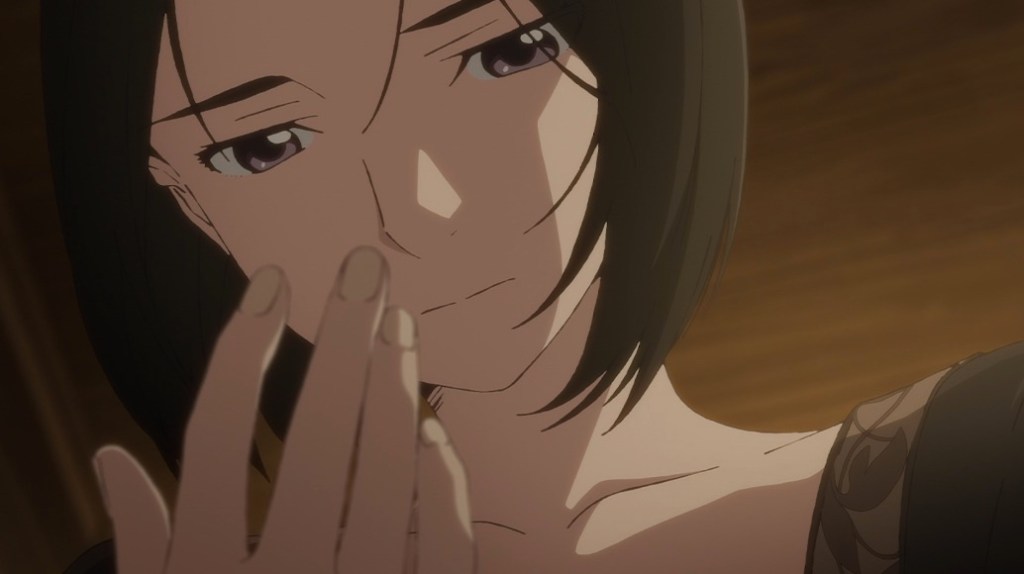
After three engrossing episodes focused on individual characters, the fourth episode of Yesterday wo Utatte splitting its focus between Shinako and Rou felt like a bit of a letdown. It’s not that Yesterday isn’t capable of dealing with more than one characters’ headspace at the same time—episode 3 gave us of some of that with Rikuo, after all. Rather, it’s that Rou’s issues, compared to the more “adult” concerns of the other three, feel more mundane. Rikuo has his relatable self-sabotaging attitudes and habits, adrift in the world without a plan or purpose. Shinako’s spinning her wheels, still grieving a loss that’s trapped her for years. Even Haru, despite being closer to Rou in age, seems more mature given her family situation and divergence from the expectations of society about what a girl her age ought to be doing.
In comparison, Rou’s all adolescence. He’s going to cram school for art, driven by a long-standing desire not to be overshadowed by his brother. He’s got a crush on Shinako, one that somehow feels even more doomed than Haru’s affections for Rikuo despite the similarities in their situations. Although they certainly mean something to him, to me they seem trivial.
Maybe it’s just a reflection of my age and the way I’m responding to the circumstances of the others in the show in which Rou exists. Although some part of me finds bemused sympathy for this try-hard, awkward teenage, another part of me couldn’t help but be annoyed by him. I suppose that makes Shinako a more mature person, or at least better at dealing with the cruelties and naiveté of teens (she is a teacher). Or maybe she just doesn’t have the energy to get angry. Rou bursts into youthful fury as they wash dishes, but Shinako’s response is just tired.
And, to some degree, that may be the point that Yesterday wo Utatte is aiming to illustrate. Rou doesn’t really understand anything about the world of (young) adults, of people who feel crushed by their pasts, drained by their presents, and uninspired by their futures. He lives in the moment as those without the perspective of experience do.
Therein, though, is the problem. It was so aggravating to watch Rou speculate and explain Shinako’s feelings about his lost brother. In contrast to the mature, caring way his father speaks to Shinako of their shared grief, Rou is tells us what Shinako is thinking. It’s invasive and presumptuous, as might be expected of an angry teenager, but I’m not sure the show itself knows this. The intercutting of scenes of Rou telling us what Shinako wants with the delicate, moving scenes of Shinako wandering her way through grief back in the room where the boy she loved died makes me think the show intended Rou’s explanation to be taken at face value. And I’m just not cool with that! As Shinako implies, he really knows nothing. When it comes to others’ experience of grief, none of us do.
This returns us to the main issue of the episode: the double character focus. In elevating Rou’s importance by giving him so much focus, his thoughts and impressions seem to be likewise validated. But if you ask me, the scenes of Shinako this episode—particularly the heartbreaking sequence of shots depicting the slow passage of the day as she sits and contemplates—deserved its own focus, divorced entirely from Rou’s story and thoughts.
Anyways, enough about Rou. I trust Yesterday wo Utatte enough to give it some time to convince me to like Rou as an element of this story. But let it be known that I’m not a fan of the way he’s been introduced into the thick of the narrative.
The other part of the episode, then, belong once again to Shinako, and was an appropriately graceful, pretty follow-up to her full introduction back in episode 2. Beautifully composed shots and effective lighting once again returned as she looked over Yuu’s belongings. I also particularly liked the way the episode depicted Rou and Yuu’s father in relation to Shinako. Although he has only a few lines, it’s clear that Shinako’s not the only one who’s having trouble accepting the loss. Everyone has their own timeline for grief, and Yesterday allowing another character to share Shinako’s struggles helps to avoid any sense that her pain is being judged or diminished.
I can only hope that Shinako’s tears at the end of the episode mark a moment of healing for her. I get the sense that it may very well have been the first time she’s allowed herself to cry over this loss.
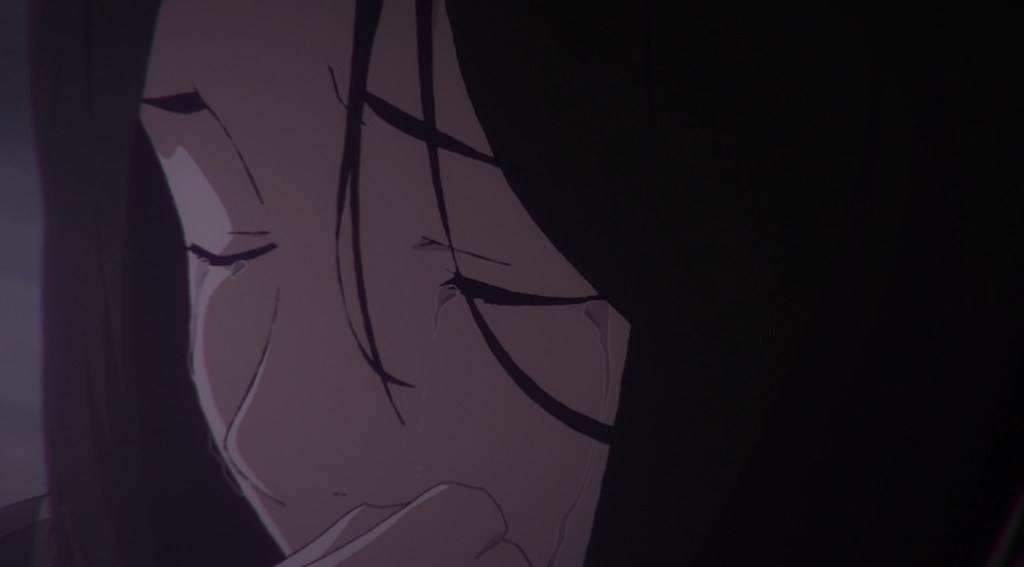
Bonus Points
—I really found myself appreciating Haru this episode. Her cheerful, lighthearted persona was a welcome relief from the oft-irritating self-seriousness of Rou and the heaviness of Shinako’s grief. Double salutes are very much welcome!
—The times I was most engaged with Rou’s story were the scenes at his art cram school. The insecurity of being around other artists, the struggle to “get good” while also not destroying your own passion for what you’re doing… that’s all good stuff. Frankly, I might have liked him more if he were more defined by his relationship to art than with Shinako and his brother.
—Rou’s arms in the his outburst at the sink was the character acting highlight of the episode for me, but some of less flashy, more incidental work was far more important in making the episode as a whole come to life.

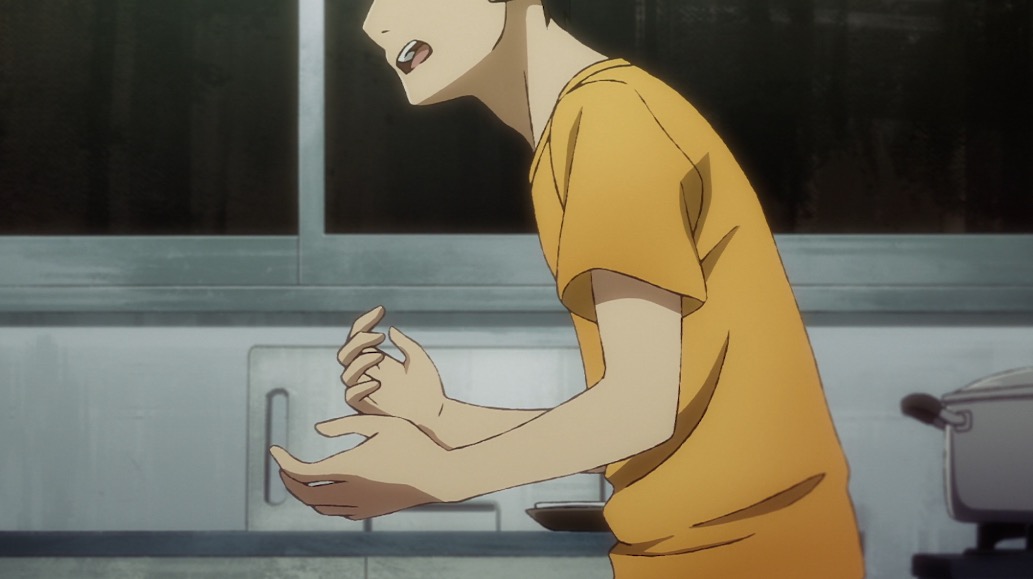
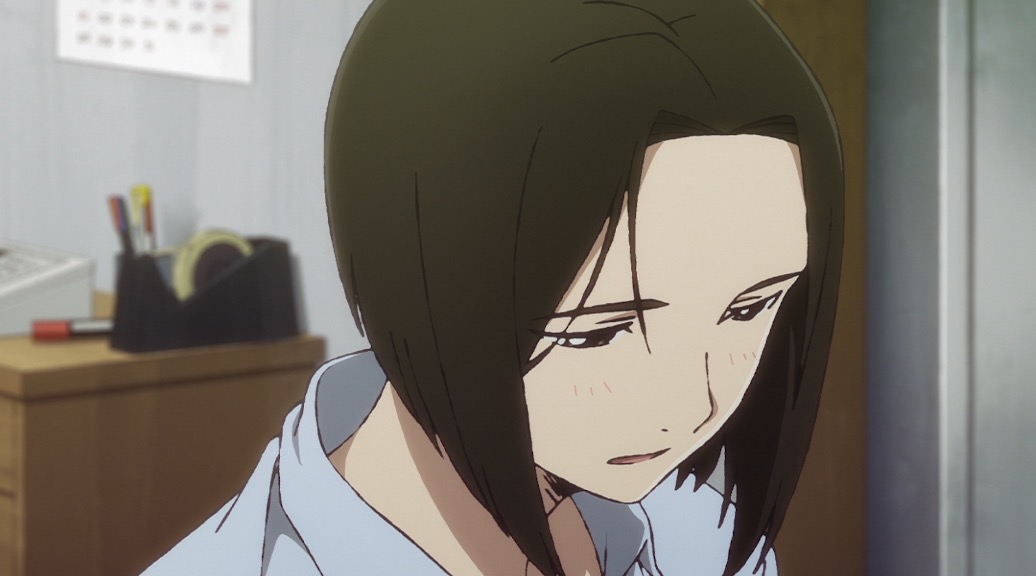
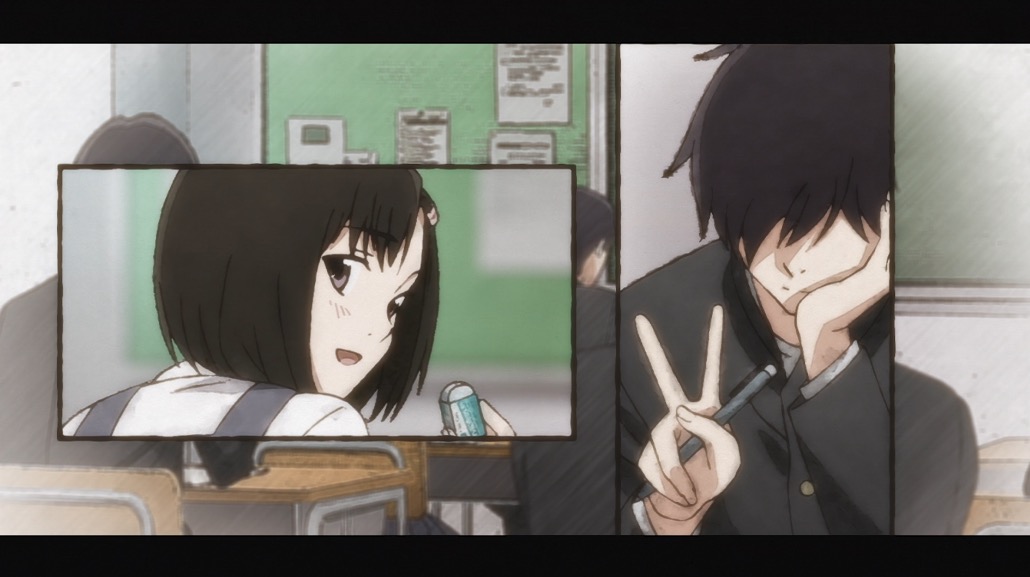
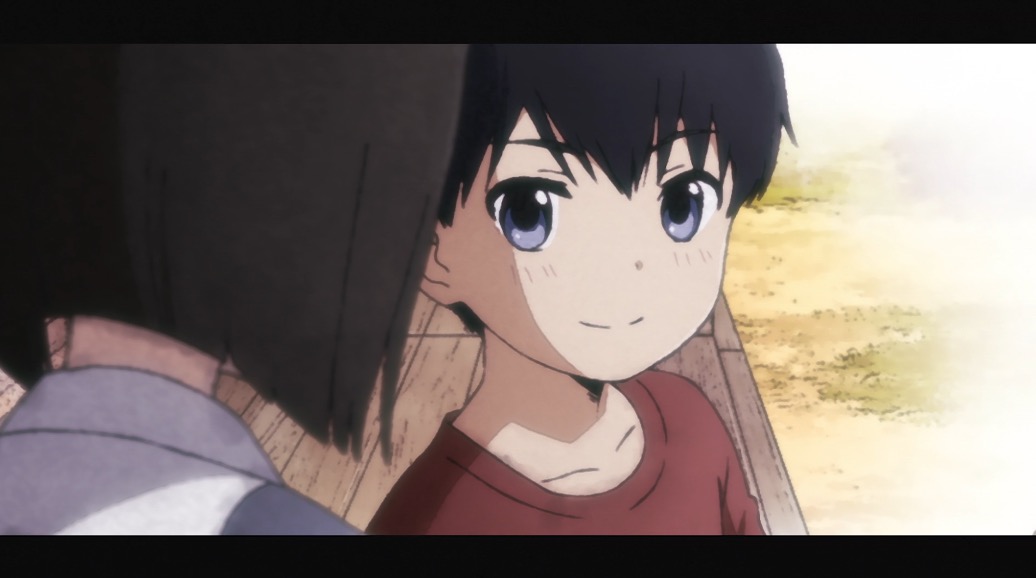
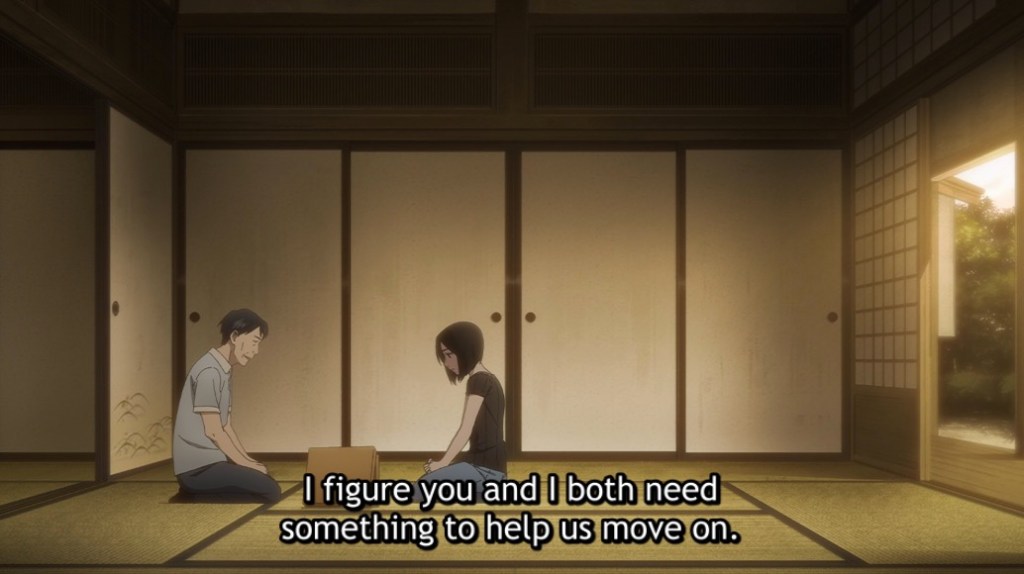
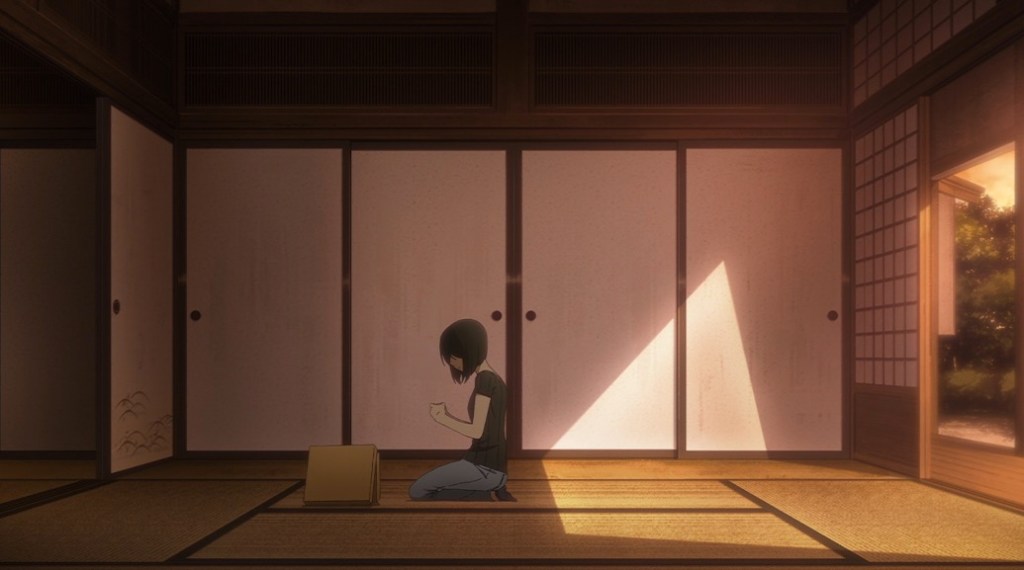
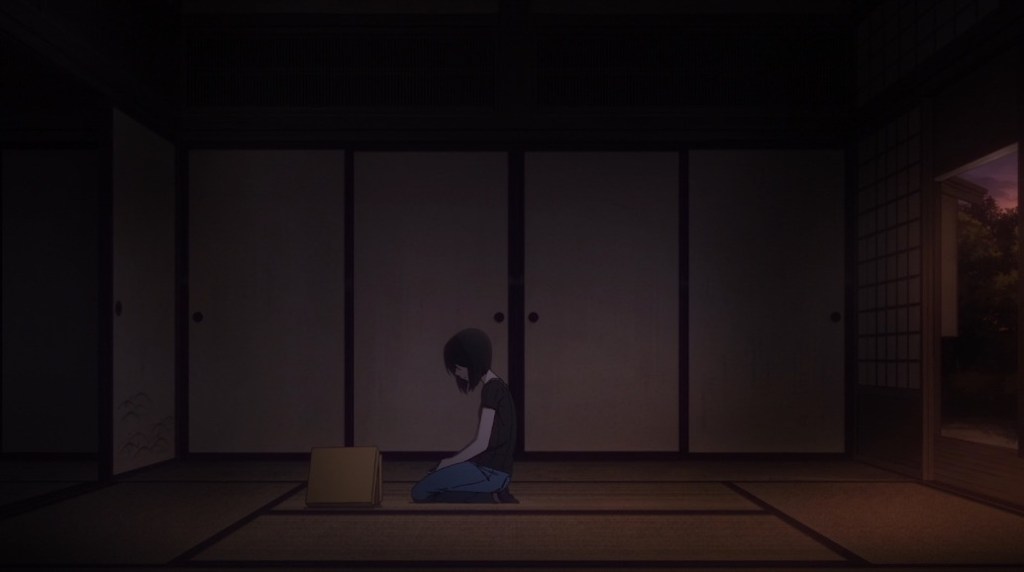
I’m… not entirely certain what role Rou is supposed to be playing here. I mean, the series didn’t need a male counterpart to Haru…. Let alone a less mature and polished version.
Yesterday seems to be built around flitting from one POV to another. Powerful technique, but as Rou’s portion of this ep shows, it can dilute the primary content.
LikeLike
Yes, as a “main” character he feels somewhat redundant and unnecessary. I’m all for ensemble casts, and having side characters having their own arcs, but this episode made me feel like Rou was supposed to be considered a major character—and I’m just not sure that something I want out of him in terms of the overall context of the narrative.
LikeLike
Rou is definitely my least favourite character among those who got a focus episode, but I do find him vitally important as a foil to Shinako. Without Rou, there’s a real danger that the depiction of grief devolves into an aesteticism (sort of the pretty girl version of Hachiko the faithful dog). This goes back to my comment about episode 2, where I’m suspecting a more complicated situation than a mourning of loss. (I really liked the father in this episode.)
I thought this episode was as focussed as any other we’ve seen so far, but it’s not a character focus. The main centre of narrative gravity was Yuu’s influence beyond the grave. We’ve seen the first glimpse of him in a flashback, where he did other things than being sickly (throwing an eraser). We see a flashback showing that Rou’s always been jealous about Shinako’s attention, but rather than assigning sympathy, it made me wonder how similar the siblings were. Maybe comparisons are inevitable in the sense that they were very similar? Or is a notable difference that Rou is a lot happier to let himself being taking care of (not having pride issues with sickness)? We’ve seen enough to speculate, but not enough to assign any sort of probablility.
As much as he would hate it, he is the proxy for Yuu in terms of narrative function so far, but that’s also exactly why he needs focus and a social environment away from home (the friend he makes at art cram school), so he doesn’t succumb to his function.
Basically, what I saw in this episode, is Shinako still being the caretaker, and Rou still standing in his brother’s shadow, without the person actually still being around, and that’s fairly consistent with my impression of episode 2.
Also, I love ensemble casts more than pretty much anyone I’ve heard talk about anime seems to, so I’m definitely biased here. It’s just the way I watch shows, and it often leads me to have too high expectations and dial them down later. Yesterday hasn’t yet shown signs of me having to dial down anything.
LikeLike
Your point about the depiction of grief devolving into aestheticism is well taken, and I thought I would have had similar concerns had the episode not ended with Shinako’s moment of catharsis (born out as I suspected in episode 5). At the same time, I do think grief is an emotion that deserves to be beautified (which is not the same as idolizing it) because it is so often is shunned in society at large. In any case, I was glad to see her in episode 5 express that she’s ready for healing.
I’m not sure I quite fully agree with your assessment of Yuu’s influence being the central focus of the episode because of how much that wasn’t about him that happened, but I would certainly have liked to have seen more about Rou’s relationship with him (as opposed to Rou’s circling around Shinako).
I’m glad to hear that you’re still enjoying it, though. My enthusiasm’s been tempered a bit recently, but not to a critical level by any means.
LikeLike
Hm, I’ve had an earlier version of this post that phrased things differently, but I discarded it because it went nowhere. In this version I said that this episode is “as focussed as any other” and then went on to say the Yuu’s influence beyond the grave is “the narrative centre of gravity”. The latter was far more prominent in my first draft, but that didn’t quite work out either.
I have a hard time articulating it, but to me focus and narrative gravity are… different but related concepts? Re-reading this post, I see how through framing it sounds like I’ve been saying that Yuu’s the focus of this episode, but that’s not what I think. I do mean the “centre of the narrative gravity”. It’s rather hard to pin down the difference, though.
It’s especially hard to pin down the difference, because none of the episodes so far focussed exclusively on one character (thank god). So in a way, I’m not sure I even have point. If I’m going with an astrophysicist metaphor, I’d say that so far the narrative centre of gravity has been suns that shed light on other things (so point of view and focus and fell together, to the extent that suns are visible themselves, too). And in a way, episode 4 is no different, with Rou providing a lot of point of view as well as point of interest. But because the other major player in this episode is Shinako, an important point of interest is Yuu, and Rou’s introduction in the Shinako episode had the function to introduce Yuu. So, even if, technically, this episode follows the same narrative structure as earlier episodes, re-contextualising Shinako through Rou, this doesn’t quite work, because – also through narrative function – Rou just doesn’t have the same amount of “narrative gravity” as Shinako. Establishing a life away from Shinako is an attempt to give him more gravity, but if that’s where the analysis ends, I’d end up with the same impression you did, and I didn’t have that impression while watching.
I think, though, I can make sense of my impression in comparsion to yours, though, if I think of the narrative centre of gravity as Yuu rather than Rou, who Rou is a proxy for. But that makes analysis difficult, because the vague and hard-to-grasp term “narrative centre of gravity” separates from both point of view and focus. Yuu is neither of those. In terms of the astrophysicist metaphor employed, he’s a black hole whose event horizon two characters try to escape, and those two characters’ gravity work on each other, too. I’m really not sure how to tackle this, which makes it even harder to talk about.
Btw, the unrequited-love conga is starting to swim out of control, with Rou’s teacher having (had?) and unrequited crush on Haru’s boss. How do these humans even breed?
LikeLike
i love yesterday wo utatte ❤
LikeLike